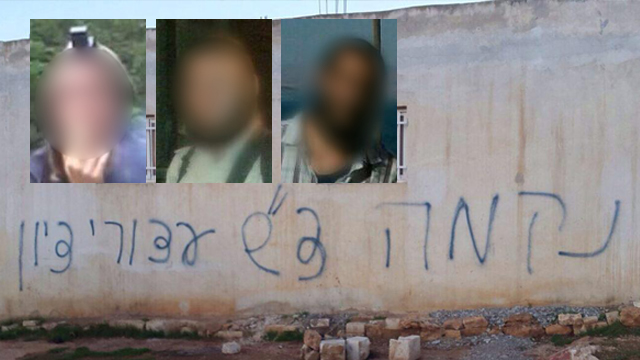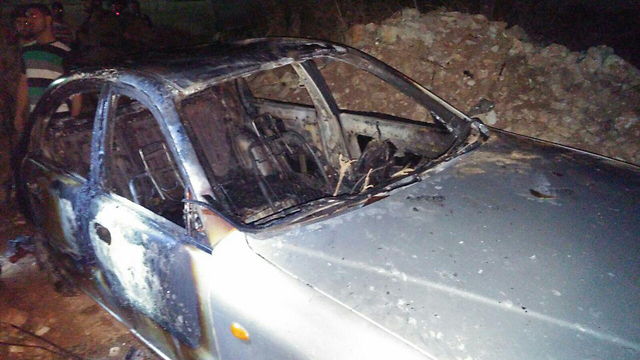Excerpts from the interrogation of the Jewish terror cell from Nahliel in the West Bank shed light on their motives and how they planned their attacks.
Ynet received excerpts of the transcriptions of the seven-member Jewish terror cell from the West Bank indicted last month that shed light on the cell’s motives and how they carried out their actions.
Among the defendants are two minors and a soldier from the settlement of Nahliel in the western Binyamin mountains, whose names are under gag order. The other defendants are: Pinchas Sandorfi, 22, from Nahliel; Itamar Ben Aharon, 20, from Beit Shemesh; Michael Kaplan, 20, from Jerusalem; and Dana Shneur, 28, from Ma’ale Efraim.
The lawyer of four of the defendants claimed that they admitted to acts they didn’t commit because of the heavy pressure exerted on them during their interrogation.

One of the defendants is a minor who is accused of a number of offenses, the most serious of which is throwing a tear gas grenade at house in the Palestinian village of Beitillu last December. During his interrogation, he said that the grenades had long been in the settlement of Nahliel, and that he knew where they were being kept.
Interrogator: “Have you ever thrown a hand grenade?”
Defendant: “No, I was afraid, but we threw it together into a window of a house in the village of Beitillu. We broke the window with a stone and threw the grenades inside.”
Interrogator: “And all this time you didn’t know what kind of grenade it was?”
Defendant: “No.”
Interrogator: “Did the grenade make noise? Did it explode?
Defendant: “I don’t know, we didn’t see anything because we ran away.”
Interrogator: “Weren’t you afraid that they would find your fingerprints on the grenades?”
Defendant: “We didn’t think about that.”
Interrogator: “Did you graffiti any place?”
Defendant: “Yes, the other minor did.”
Interrogator: “Do you remember what you did with the safety pins?”
Defendant: “I don’t remember.”
Interrogator: “Who threw the first grenade, you or the other minor?”
Defendant: “Together, I believe, we didn’t decide on it.”
Interrogator: “What did your graffiti say?”
Defendant: “Revenge for the prisoners of Zion.”

According to the indictment, the tear gas incident occurred while the suspects in the July 2014 Duma attack were being questioned. The boys from Nahliel sought “to send a message” to Israeli government officials that the arrest of those responsible for the Duma attack would not prevent ‘price tag’ attacks. Therefore they sought to harm Arabs, and on December 22, they armed themselves with IDF gas grenades, spray paint and gloves. Later came the hill near Nahliel, waited until nightfall, and planned the attack.
According to the indictment, around 1:30am, after they wiped their fingerprints off of the grenades, left their mobile phones behind, covered their faces and put on gloves, the defendants walked to the outskirts of the village of Beitillu and arrived at one of the homes, where a couple and their nine-month-old baby were sleeping.
One of the boys sprayed “Revenge, greetings to the prisoners of Zion” on the wall. The defendants then smashed a nearby window, threw grenades into the house, and ran off. They’ve done all of this, the prosecution said, while knowing there were people inside the house.
After they threw the grenades, tear gas began to spread throughout the house and the people inside began to tear up and feel suffocation. The couple then took their baby and fled the house.
However, despite the confessions, questions still linger regarding the case, the main one being that neither the grenades nor the safety pins were found at the scene and as a result, the defendants’ fingerprints were not found at the scene. In addition, the defendants could’ve known what was spray-painted on the wall, as it was reported in the media the day after the incident.
One of the charges in the indictment is of setting fire to a Palestinian vehicle and throwing stones at other Palestinian vehicles on the night of the terror attack in which Naama and Eitam Henkin were slain in front of their children.
In his interrogation, another defendant, a relative of the aforementioned minor, talked about the tense atmosphere in the settlement following the attack and the decision to take action: “Everyone who was there talked about the attack. We had a very difficult conversation because Jews were murdered and we were all very distraught. I took the two minors aside and we talked about the possibility of destroying Arab property. In that conversation we decided I would drive the car and an idea was raised to go and throw stones at Arab vehicles and then the idea to go and set a vehicle on fire was also raised.
“I put a hat on my head so I wouldn’t be recognized. When I pulled over, the others crossed the street to where a Palestinian car was. They slashed the car’s tires, smashed the windows and set it on fire. I had the engine on and the lights off.”
The charges against the members of the cell include violence and arms offences against Palestinians and their property in the Samaria region.
Attorney Nechumi Feinblatt, who represents four of the suspects, said that “these are ‘confessions’ extracted after a week in the dungeon, during which the defendants were learning from the interrogators how the attacks were committed, memorizing the details they were given and trying to please the interrogators and create a ‘confession,’ all so they could leave the 2×2 meters dungeon, which was sealed without any windows and with a light on 24/7.
“The defendants banged on the dungeon’s door and begged to speak with an interrogator just so they could see another human being and breathe different air. During a week, they were interrogated for only two hours, and the defendants considered it a ‘reward’ to get to talk. Pinchas wanted to speak with another human being so much that he confessed to three other car arsons and throwing stones while giving detailed information—the interrogators didn’t believe him and realized he was making it up just to get time in their company.
“It’s lucky that the incidents they ‘confessed’ to actually happened—that way the interrogators could believe the ‘confession,’ which was extracted through mental torture. I’m certain that 80 percent of the public, after a week in a 2×2 dungeon with the light on 24/7, would confess to anything they are familiar with, just to receive perks from the interrogators. In such a situation, a conversation is also a perk.”
As reported by Ynetnews
